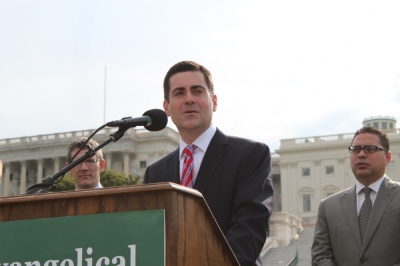Evangelicals Urge Trump to Protect Immigrants, Families in 'Temporary Protected Status' Program

An evangelical coalition that lobbies for immigration reform has asked the Trump administration to extend the "Temporary Protected Status" program for four nations.

Signatories for the EIT's letter included Leith Anderson, president of the National Association of Evangelicals; Shirley V. Hoogstra, president of the Council for Christian Colleges and Universities; Russell Moore, president of the Ethics & Religious Liberty Commission of the Southern Baptist Convention; and the Reverend Samuel Rodriguez, president of the National Hispanic Christian Leadership Conference.
The TPS program allows for nationals from certain designated countries to remain in the United States due to temporary conditions that would make it dangerous to return them, such an armed conflict or a major natural disaster.
The Evangelical Immigration Table sent a letter to the Department of Homeland Security on Wednesday requesting the government extend the program designation for El Salvador, Haiti, Honduras, and Nicaragua until Congress can make certain changes to TPS.
The evangelical group warned of the problems that would occur if the approximately 300,000 individuals from those four countries living in the United States under TPS protections were suddenly forced to return home.
"Most are parents of one or more U.S. citizen children; if these parents were to be deported or simply no longer be authorized to work, it would create a significant strain on these U.S. citizen children and other immediate family members," stated the letter.
"Withdrawal of TPS at this time—without a long-term, legislative resolution of these individuals' situation—would also have a significantly negative impact on the countries to which these immigrants would potentially be returned."
The letter went on to argue that while each nation was designated several years ago, the four countries remain a problematic place to send people back to.
"Regrettably, many of these countries remain unsafe even after many years. In any case, we are working with Congress to make needed reforms to the TPS program," continued EIT. "The situations of long-term recipients of TPS status are complex and demand a legislative solution."
In a statement released Wednesday, CCCU President Hoogstra stressed the contributions of individuals living in the United States through TPS status.
"They have contributed to, and continue to contribute to, our society by forming families and strengthening our economy as students, workers, entrepreneurs and consumers," stated Hoogstra.
"Extending Temporary Protected Status is the right thing to do for both the American economy and for American families."
EIT's letter came in response to serious consideration from the Trump administration and others to ending the TPS designation for several countries.
Earlier this week, Senate Judiciary Committee Chairman Chuck Grassley sent a letter to DHS questioning the maintaining of TPS status for various nations, including those EIT is lobbying on behalf of.
One specific issue was the claim that certain TPS designated countries are too dangerous to return to, with Grassley writing that evidence indicated that "conditions are not so dire as to prevent a return to the TPS country."
"For example, TPS for El Salvador, granted after earthquakes in 2001 and extended several times since, expires on March 9, 2018. In 2016 alone, however, 51,474 non-immigrant visas were issued to nationals of El Salvador, and 50,496 nonimmigrant visas were issued in the capital city of San Salvador," wrote Senator Grassley, as quoted by the Daily Caller.
"TPS for Honduras and Nicaragua, first granted nearly 20 years ago (on January 5, 1999) and extended many times since, expires January 5, 2018. In 2016, however, 54,411 nonimmigrant visas were issued to nationals of Honduras (54,027 from the capital, Tegucigalpa), and 19,254 nonimmigrant visas were issued to nationals of Nicaragua(18,550 from the capital, Managua)."






















